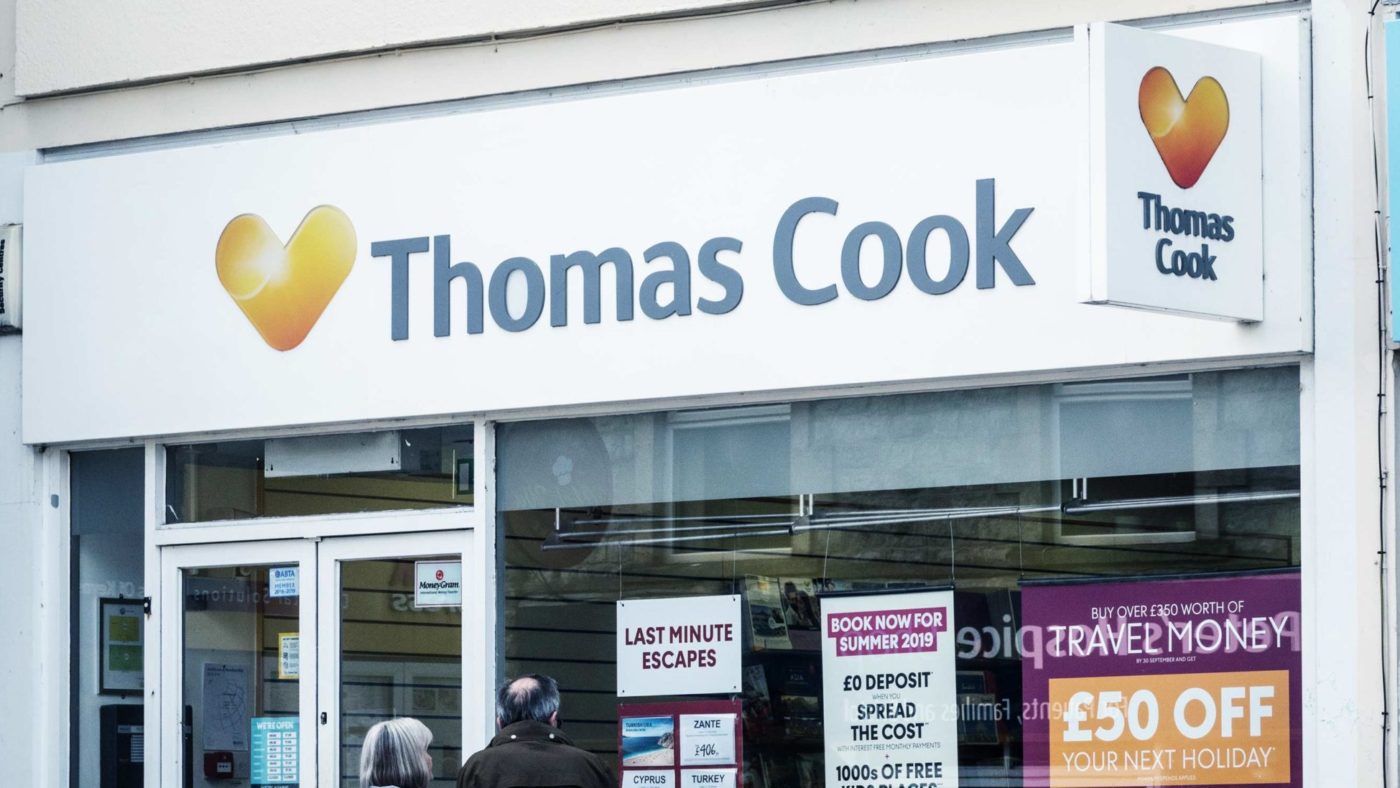As was widely predicted, we woke up this morning to the news that Thomas Cook has collapsed.
The ramifications are certainly keenly felt, with 22,000 jobs at risk worldwide in jeopardy, of which 9,000 are in the UK. The company also currently has 600,000 customers on holiday. Among them are 150,000 Brits who will need to be repatriated at a cost taxpayers of over £50 million. Then there are all the people who have now had their plans to travel abroad – including to get married – cancelled.
As ever when a big company is in peril there are calls for the government to step in, including from the shadow chancellor John McDonnell.
Needless to say, a government bailout for Thomas Cook would be a bad idea. Readers of this site will be familiar with the reasons why bailing out any company is a bad idea, and so there is no need to go into great detail. To put it briefly, it would involve using taxpayers’ money to put off the inevitable – money which would have been more efficiently allocated elsewhere in the economy. It’s also worth noting that Thomas Cook had been nationalised once before, and that could hardly be regarded as a success.
But while it looks like Thomas Cook cannot be salvaged, what can we learn from its failure?
The main reason the company failed was its outdated business model. Thomas Cook offered comprehensive holiday deals which would include flights, accommodation, and transport to and from the airport. It could even organise your wedding.
For much of the twentieth century this worked perfectly well. It was a convenient and affordable way to book a holiday. However, given the number of price comparison sites now available, the idea of popping into the local travel agent’s to speak to somebody about booking a holiday seems almost unthinkable.
In many ways this is an example of what Joseph Schumpeter referred to as ‘creative destruction’. New technologies come along which disrupt old industries and practices. The companies which do not adapt will be destroyed, but those that do will thrive. Although there is destruction in the short term, there are also increases in productivity which brings economic growth and prosperity.
The sad demise of Thomas Cook also highlights the pressures facing high street firms. As has been well reported, many high streets have been decimated over the years, creating ghost towns. For some the solution is to ‘level the playing field’ by taxing tech companies more. Equally there are those who argue that the government should simply abolish business rates. Both of these are wrongheaded. Taxing tech companies more will simply lower investment, drive up prices, and hit the wages and employment opportunities of those who can least afford it. Whereas abolishing business rates will just lead to higher rents.
Instead, the government should be reforming the most damaging taxes and regulations, which I have set out In a paper published today by the TaxPayers’ Alliance. Fuel duty and vehicle excise duty both increase transport costs for businesses, while stamp duty on shares and capital gains tax decrease investment and keep capital ‘locked in’. These are just a few examples, there are many more.
Thomas Cook was also massively in debt. There are, obviously, many reasons why companies become indebted, but the bias towards debt financing in our tax system is at least partly to blame. For example, if a company decided to fund a project new project or development through borrowing, then it would be able to deduct interest payments – leading to a lower tax bill. However, if the company decides to finance its activities through issuing shares, then it cannot deduct the dividends payout as a cost, so it ends up paying more tax.
The tax system also targets business investment in other ways. For example, when businesses invest in new plants and equipment, they are required to deduct the costs over time, through a provision known as depreciation deductions. Due to inflation, businesses cannot claim back the actual amount spent.
Looking at the airline industry in particular, one of the specific pressures they face is from air passenger duty (APD), which adds a hefty percentage onto ticket prices It is obviously important to ensure that the negative externalities of air travel are dealt with, so calls for APD to be abolished without an alternative system in place are wrongheaded. However, a simpler and fairer solution would be to abolish all environmental taxes and regulations and bring in a border-adjusted carbon tax with carbon dividends.
There are other reforms to Britain’s aviation industry that are long overdue. Finally building the extra runway at Heathrow would seem like the obvious starting point and is badly needed.
Then there are the ideas suggested by the Adam Smith Institute such as reforming the slot allocation for landings and takeoffs, which allows hoarding by the big airlines and stifles competition. Introducing slot auctions would ensure that those slots go to airlines who are prepared to pay the most, thereby increasing efficiency. It could also help the UK to lead the way in developing new flight technologies. For example, low-altitude airspace could be auctioned off to be used by air taxis and autonomous freight drones.
The demise of Thomas Cook is a tragedy for its staff and customers. However, it demonstrates that the government needs to ease the tax and regulatory burden on high street businesses, reform corporation tax, and eventually scrap air passenger duty. It should also get on with expanding capacity at Heathrow and introduce free market solutions which will drive competition and innovation so that the aviation industry in the UK can really start to soar.
CapX depends on the generosity of its readers. If you value what we do, please consider making a donation.


